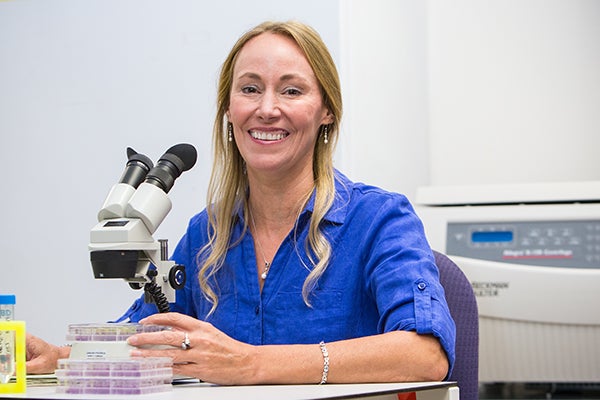ECU professor named to national committee on equity and inclusion
Dr. Rachel Roper, professor in the Department of Microbiology and Immunology in the Brody School of Medicine at East Carolina University, has been appointed to the American Society for Microbiology (ASM) inaugural IDEAA Committee of the Board.
The committee, made up of members from across the nation, will focus on promoting and advancing the microbial sciences through the elevation, embodiment and sustainability of inclusive diversity with equity, access and accountability (IDEAA).
“In 2018, I asked the Board of ASM to explore how we could further elevate DEI in the society to better serve the microbial sciences. I could not be prouder of all that this excellent team of volunteers and staff has accomplished,” ASM CEO Stefano Bertuzzi said. “The large number of applicants that we received in response to our open call to populate the IDEAA Committee is very encouraging. I wish the committee members all the best as they continue to do excellent and impactful work, and I am here to support them.”

Dr. Rachel Roper, professor in the Department of Microbiology and Immunology in the Brody School of Medicine, named to a national committee on equity and inclusion in microbiology. (Photo by Cliff Hollis)
Roper was one of five inaugural members selected from among 50 applicants for seats on the committee. She will begin her term on July 1.
“It’s a great honor to be on this national board,” she said. “I believe I was appointed because I have worked for diversity, equity and inclusion in science and academia for 15 years.”
The new IDEAA committee will focus on bringing equality to the academia in microbiology.
“We are a committee of the Board of ASM so we can work from the top, at a strategic level to improve diversity, equity and inclusion in ASM and in our field, nationally and internationally,” she said. “We will ensure transparency and inclusion in ASM leadership and committees; increase accessibility for ASM meetings and improve data collection about ASM members. We need data to know where we are and to measure our progress (race, gender and other demographics).
“We will improve and provide additional mentoring for undergraduate and graduate students and post-docs from historically underrepresented groups. This should help lessen the isolation often felt by people who don’t automatically and easily fit in to an established group. We will work to identify and remove barriers to success for underrepresented groups; and raise awareness and develop and offer educational information and tools online for all of our universities and members across the country.”
Roper said equity issues infiltrate science fields, including microbiology.
“Women and minorities are greatly underrepresented in all STEM (science, technology, engineering and math) fields, and studies have shown there is widespread unconscious bias against women and minorities,” she said. “Fortunately, several studies provide evidence that programs that raise conscious awareness of gender bias can improve equity in science, and there are a number of recommendations and strategies for improving the participation of women.”
The inaugural committee, she added, has an opportunity to set a standard for the topics the committee addresses now and in the future.
“I hope we can raise awareness of unconscious bias that affects the careers of historically underrepresented groups (woman and racial/ethnic minorities in STEM). Awareness is the first step. There are strategies that have proven effective in increasing diversity, in faculty hiring and in promotion and tenure decisions,” she said. “Mentoring underrepresented students, trainees and faculty can help them succeed, and providing support systems so people who are pioneers in the field don’t feel so isolated. By increasing success of previously underrepresented groups, we also provide role models and mentors for younger students and scientists.”
Roper has been invited to present more than 40 seminars and presentations on bias — mostly focused on gender but also including race/ethnicity — and how to improve equity, diversity and inclusion at local, national and international conferences, the U.S. National Institutes of Health, and to U.S. NSF ADVANCE teams at other universities.
Last summer, she organized and led an in-depth symposium at an international conference for the American Society of Microbiology and the World Microbiology Forum titled, “What YOU can do to increase Equity and Diversity at your Institution: from Students to Deans.” She was the Principal Investigator on the ECU ADVANCE Faculty Race/Ethnicity, Lesbian, Gay, Bisexual, Transgender (LGBT) Survey and the IRB, and has published two articles focused on gender bias in STEM. She was a co-principal investigator on the U.S. National Science Foundation (NSF) ADVANCE grant for women in STEM at ECU received last year. Roper was also appointed to a three-year term on the new Faculty Senate ECU Committee on Diversity, Equity and Inclusion.
Roper has been chair of several committees: the Brody School of Medicine Women’s Faculty Committee, the Chancellor’s Committee on the Status of Women, Brody School of Medicine Promotion & Tenure Committee and ECU Faculty Welfare Committee. She was awarded the Brody School of Medicine Women’s Advocacy Award, ECU Woman of Distinction Award, ECU Faculty Senate 50th Anniversary Recognition Award.
Roper said she is pleased to serve on a committee that has the potential to make an impact on a national level — and at ECU.
“I hope I can both learn strategies from other people on the committee and bring ideas from ECU committees to contribute to national efforts. This way, we can all implement the best ideas and strategies here and nationally for student and faculty success,” she said. “Since we are a committee of the board of ASM (with over 30,000 members) and are being recognized nationally as leaders in DEI, I think it’s very prestigious for ECU. We will also benefit by being tied into the national movement to enhance DEI, learning all of the best implementation techniques.”